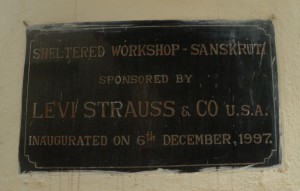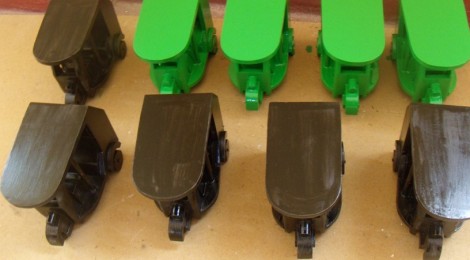
Despite visiting Ummeed and NASEOH, 2 Bombay-based NGOs that work for the mentally disabled, I was apprehensive about my visit to the Association for the Mentally Challenged (AMC). How should I greet the beneficiaries? What language should I speak to them in? What tone? How should I respond if I do not understand what they are saying? Nagging thoughts on appropriate mannerisms when interacting with them plagued me till an hour or so into my visit. Because that’s how long it took for me to be at ease and comfortable with the people there – in fact more so than I would have ever imagined! And this was all thanks to the organisation’s beneficiaries, who welcomed me with wide and wider toothed smiles. Extremely happy to meet me, their “Good Morning” through my day-long visit made me forget all the apprehensions I had.
We began our day at Akruti, which is AMC’s special school that provides special education for children in the age group of 4 to 16 years. An intellectually-challenged child needs a curriculum tailored to individual needs and Akruti addresses this need through its specially designed classroom sessions. In the classroom, children are grouped according to their mental age and the language they speak. Says Dr. Rupande Padaki, Hon. Secretary of the AMC, “We don’t go by chronological age. We look at the IQ level. We look at the learning capability and accordingly we categorize children.” At Akruti, the children are taught to be independent in daily activities. They are encouraged to participate in sports and cultural events and learn to interact with others. Their development is further aided through creative fields like dance, music, painting and crafts, sports and speech therapy. Importance is also given to self expression. Each child’s development is monitored periodically.
Says a parent of a 6-year-old child who suffers from Down’s syndrome “My daughter has been at AMC for the last year. As parents, we wanted very much for our daughter to study in a ‘regular’ school. However, our past experiences were very unsatisfactory. For example, at the nursery school, the teacher would only involve other children in singing and dancing, as my daughter was not coming forward of her own accord. At the primary school, teachers expected my daughter to talk like a normal child. As you know, children with Down’s Syndrome have special difficulty with speech. As a result of her difficulty with speech, the headmistress of the school advised us to shift my daughter to a special school. That is how we came to AMC. During the last year, my daughter has made considerable progress. We are very happy with the development. The changes are in the areas of writing, recalling, eating, wearing shoes and toilet training.”

We then proceeded to Pragati – AMC’s vocational training center meant specifically for trainees of 16 years and above. Pragati was setup to equip AMC’s children who had now entered adolescence and adulthood with relevant occupational and vocational skills; as there was a need to make them as self-sufficient as possible. From paper bags to shopping bags to candles and handmade paper, Pragati equips them with skills that help these adults become and more importantly, feel like productive members of society. I stress on the latter because as we witnessed, and as Dr. Pakadi clarified, most beneficiaries are not able to make the products (be it candles, shopping bags or anything else) entirely on their own. But when they learn that products that they helped make have been sold, they are on top of the world! This is the reason why AMC plans to invest more efforts in marketing these products, in the near future.
Of all the sections, it was the daycare center that really brought a gasp out of me! The 15 people in this ground floor are severely retarded; which means they require care for all of their needs. Their families send them to the AMC during the day, so that they are able to carry out other errands and responsibilities during this time. As one parent whose 19-year old daughter comes to AMC, says “For me, my daughter going to AMC is important. As a single parent, I worry about the future. However, for the present, the AMC respite care is a godsend facility for my family. I also want to add that as my daughter is in a protected facility, I am able to carry on with my professional work.” Music is constantly playing in this room as it helps keep these individuals calm. Whilst here, they are kept engaged through occupational therapy related activities like paper folding, sanding wood, creating balls of yarn and watering plants.
I also joined the AMC staff and students for lunch, which is sponsored by the Akshaya Patra Foundation. AMC’s personal touch was visible at lunch too with the staff knowing exactly how much quantity of rice and sambhar each of the 200 students were to be given! This helps avoid wastage and also ensures that all students eat well.
AMC’s aim is to educate, train and rehabilitate mentally challenged individuals as well as their families. One area they have been facing great difficulty in, is in integrating their students into mainstream society. Primarily because, as Dr. Pakadi says, “In society, people really don’t know how to deal with special people.” This has led them to absorb many of the students within AMC itself since getting them placed outside is such a big challenge. In fact, it was this difficulty that led them to set up Sanskriti – their sheltered workshop that was started with seed money from Levi Strauss Co. back in 1996. Sanskriti provides them a protected and supportive setting to work. The 30 people who currently work here under minimum supervision to make doormats and other products, receive incentives in the range of Rs. 300- 1,600 per month.
AMC’s attempts to get their beneficiaries to enter the open market and hold jobs has also resulted in computer training (for backend activities like processing of telephone bills) being added to this section. Through this and all its other activities, AMC hopes to counter their biggest challenge, which also happens to be most parents’ biggest fear – “What will happen when I am not there?”
Established in 2000, Give is the largest and most trusted giving platform in India. Our community of 2.6M+ donors have supported 2,800+ nonprofits, impacting 15M+ lives across India.
Discover more from
Subscribe to get the latest posts sent to your email.
